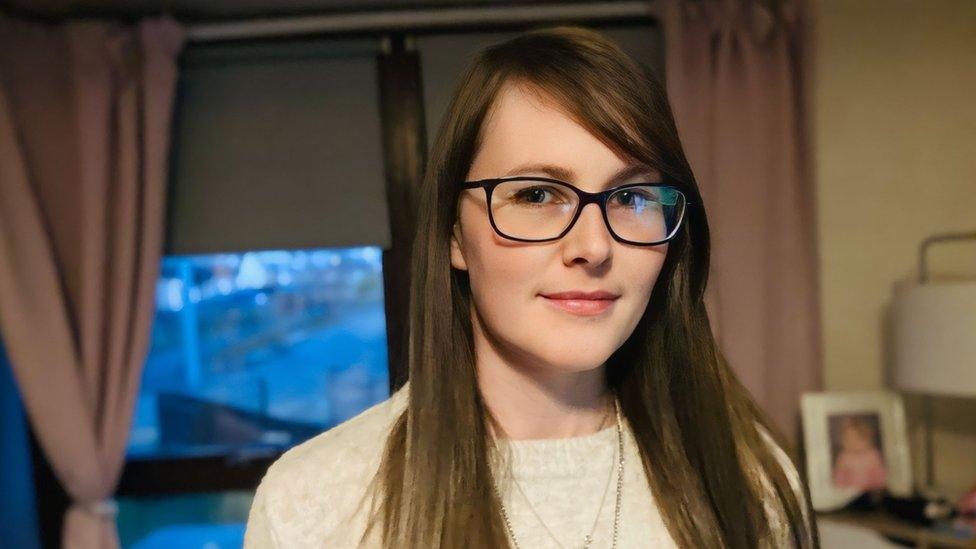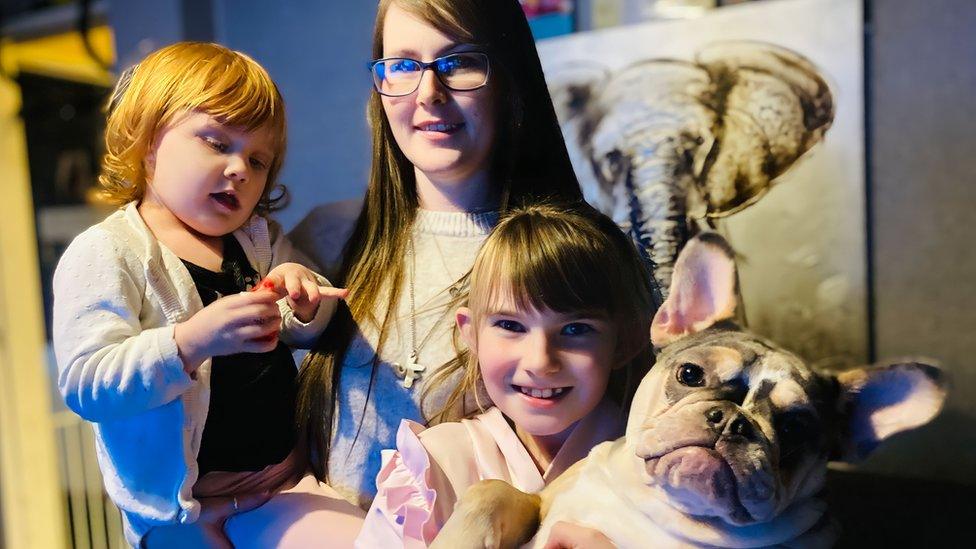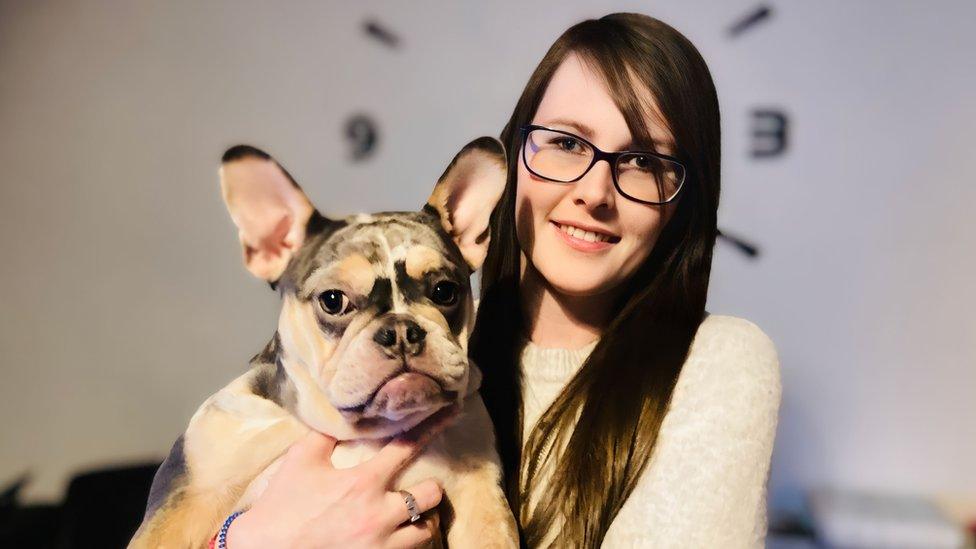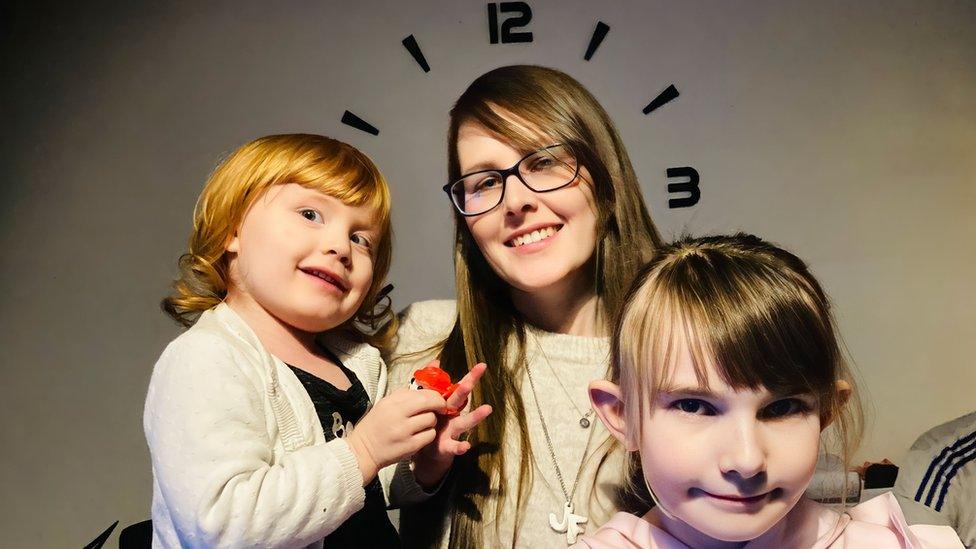'I want to work but struggle to leave my house'
- Published

Agoraphobia is twice as common in women as in men
Chelsea Birkett has agoraphobia and has scarcely left her house in four years, but the Covid lockdown meant she got a job working from home 100% of the time.
However that changed when the pandemic restrictions were lifted and employers pushed for people to spend time in the office again.
Since then Chelsea has applied for hundreds of roles but has been unsuccessful.
Even when jobs are listed as home-working they still want people in the office regularly.
Chelsea, who lives in Aberdeen with her two young daughters, says she has a fear of being in situations where escape might be difficult, after a panic attack while working as a prison custody officer.
"If I was to have a panic attack outside, I wouldn't be able to escape the situation," the 30-year-old says.
"I'm receiving help, and I'm slowly getting better. I can manage a short walk now, but I still struggle leaving the house."

Chelsea lives in Aberdeen with her daughters Eleira, Scarlett-May and their dog Dinah
The NHS website, external says many people assume agoraphobia is simply a fear of open spaces but it is actually a more complex condition.
If someone with agoraphobia finds themselves in a stressful situation where help would not be available if things went wrong they could experience the symptoms of a panic attack.
It is estimated that two people in every 100 in the UK have a panic disorder and a third of those people will go on to develop agoraphobia.
It is twice as common in women as in men and usually starts between the ages of 18 and 35, the NHS says.
Chelsea, a qualified paralegal, developed the phobia in September 2018 while working as a prison custody officer.
"I had just taken a prisoner from the court to the holding cell and I just remember not being able to breathe very well," she says.
"I was not feeling good at all and thought I must be coming down with a chest infection so I asked my boss if I could go home."
That weekend the feeling of breathlessness continued so she booked herself a doctor's appointment.
"I went to the doctors on the Monday and took the biggest panic attack I've ever had in my life," Chelsea says.
"I couldn't breathe, I was disoriented and had this like mad sense of fear. Ever since that day, I've not been able to leave the house."

Chelsea is a qualified paralegal
She received sick pay from her employer before quitting in 2020 and was unemployed until remote working jobs became more common due to the Covid-19 pandemic.
"Because of that, I actually got an admin job with an online mental health platform really easily," she says.
"I didn't even apply for it. I uploaded my CV on to [jobs website] Indeed and they reached out to me."
Then, when restrictions began to be lifted, Ms Birkett's employer started to push for people to come back into the office.
"For me that just wasn't possible, so I left," she says.
"Now even when jobs are advertised as home-working, I get told that I'd need to come into the office once a month, or for training. Finding one that is 100% remote is near impossible."
Flexible working
Chelsea says she ideally wanted to work part-time hours but would make a full-time job work around her children if she could be flexible with her hours.
"Having a job I could do from home would make a phenomenal difference financially to us as a family," she says.
"It would help my mental health too, to have more purpose."
A study carried out by social business Timewise found that only 27% of Scottish job adverts mention roles are open to flexible working.
Flexible working is a way of working that suits an employee's needs, for example having flexible start and finish times, or working from home.
Flexibility Works, a social business which aims to help employers develop more flexible workplaces, believe that the lack of employers advertising flexibility within their job roles is making it harder for the estimated 90,000 Scottish adults currently seeking work, to find it.

Chelsea has spent a lot of time looking for a job she can work completely remotely
The business' co-founder and director, Nikki Slowey, says: "Many people don't know where to find flexible jobs."
"Not helped by the fact that even companies open to flexible working don't always think to promote this in their job adverts.
"Without flexible working, many brilliantly skilled and experienced people simply can't work at all - this is particularly the case for parents, carers and people with a health condition."
Chelsea has been job searching for the past 16 months and said that the constant knockbacks and rejections had started to affect her self-esteem and confidence.
"It's hard because I'm applying for like everything and I've tried explaining my situation to recruiters," she said.
"Even though I've always had excellent reviews for my work and I know I'm capable, I just get told time and again that unfortunately they'll have to take me off their list.
"It's so disheartening and frustrating given that for so long things had to be 100% remote and companies still functioned fine."
Chelsea receives counselling from Aberdeen University and practices exposure therapy to try and get over her phobia.
"Until then I just hope I can find a remote job," she said.